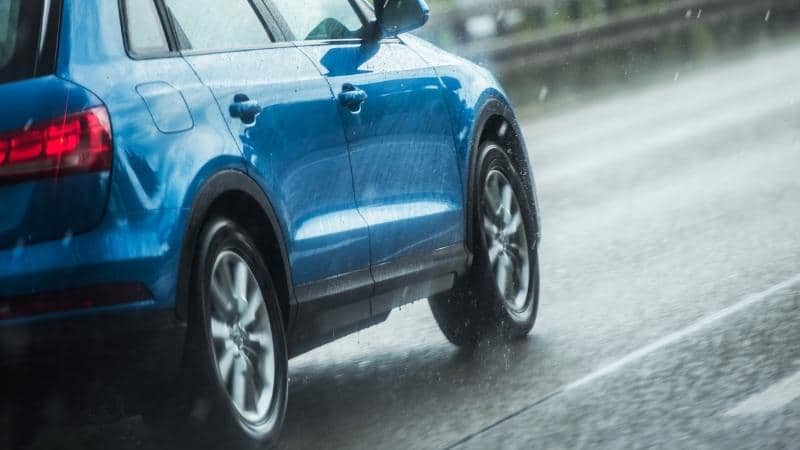Are you currently using or perhaps looking for a full set of new all-season tires?
No matter what, all-season tires are a great choice. These jack of all trades tires perform well in both hot and cold weather, run smooth on the ground and last the longest of all the tire types out there.
But, what about using them in rainy weather? Are all-season tires good in the rain as well?
Most all-season tires perform well in rainy conditions, however not as well as the more specialized summer tires. Summer tires perform better in the rain because they’re built with a sticky tread compound that’s perfect for wet road traction. Many summer tires also have bigger grooves that help push water away from the tires.
Read on to learn more about all-season tires performance in rain and how they stand agains both summer and winter tires when it comes to driving in wet conditions.
Factors That Make a Tire Perform Well in The Rain
Wet-weather frequency. If you travel in wet weather regularly, finding a tire that performs well in the rain may be more important than driving in wet weather on occasion. Before selecting a rain tire, consider the general climate where you perform most of your driving.
Vehicle type. Your choice of wet-weather tire will be influenced by the sort of vehicle you drive. A sports car, for example, naturally performs differently in the rain than a truck, necessitating different tires in general, and the handling tendencies of different vehicles may also influence your choice of wet-weather tire.
Driving style. The type of tire that’s best for you depends on your driving style and habits. If you typically drive in dry circumstances, an all-season tire may be sufficient for your needs in the rain. Drivers who spend longer time behind the wheel and in more tough conditions, especially in the rain, may require a more specialist tire.
Rubber composition. When choosing your next set of tires, consider how the rubber compound of a particular tire may affect its performance in the rain. Different tire materials can impact how the tire interacts with rain on the road, so ask about rubber compounds before buying.
Tread pattern. Choose a tread design that directs water away from your tire. This will help increase the tire surface that comes into touch with the road, improving traction and grip. Examine the tread patterns of the tires you’re considering purchasing and compare them to ensure you get the best tire for your needs.
Budget. At most pricing points, you can buy a solid wet-weather tire, however, higher-quality tires may cost a little more. If you can only afford one new pair of tires, all-seasons are a better option than summer or winter tires since they can handle a wider range of situations.
Are All-Season Tires or Summer Tires Better in The Rain?
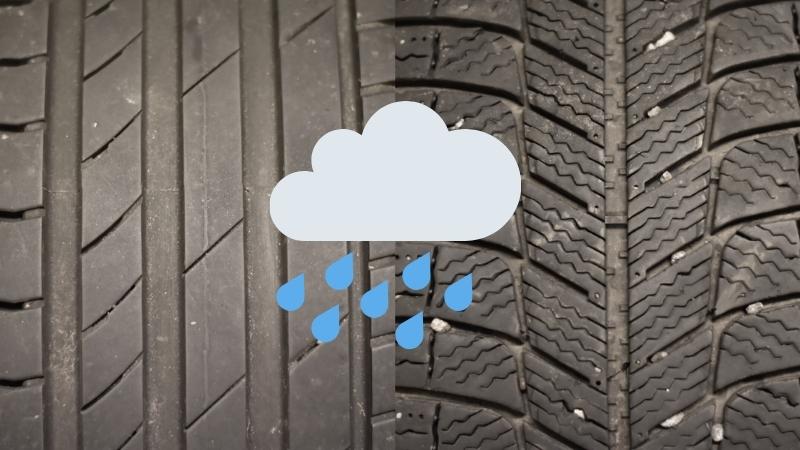
Summer tires outperform all-season tires on wet pavement, which may surprise you. This has been shown in multiple tests that’s been conducted over the last couple of decades.
Summer Tires Work Better Than All-Season Tires in Both Rainy And Sunny Weather
Summer tires provide excellent road grip whether the weather is scorching hot, mildly damp, or pouring down severely.
Tire Rack has performed two tests, one on Ultra-High Performance All-Season Tires and the other on Max Performance Summer Tires. They gathered data for everything from ride quality and noise comfort to handling, braking behavior and overall traction, both on dry and wet surfaces.
What’s interesting to us in this post is the overall difference between wet surface driving using all-season or summer tires. And interestingly, the summer tires out-performed the all-season tires in every test conducted, both in wet and dry conditions.
Here’s a chart of the differences between the two types of tires when it comes to slalom time, test track lap time, stopping distance and g force. (You can see the individual tests by following the links above as well):
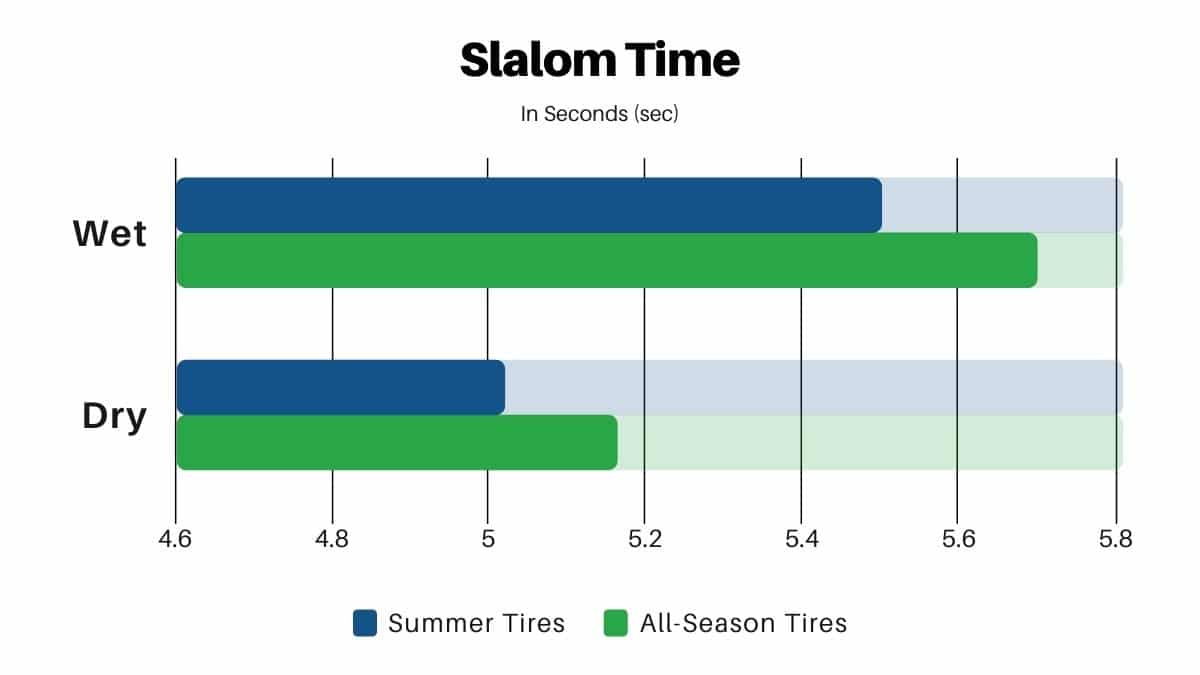
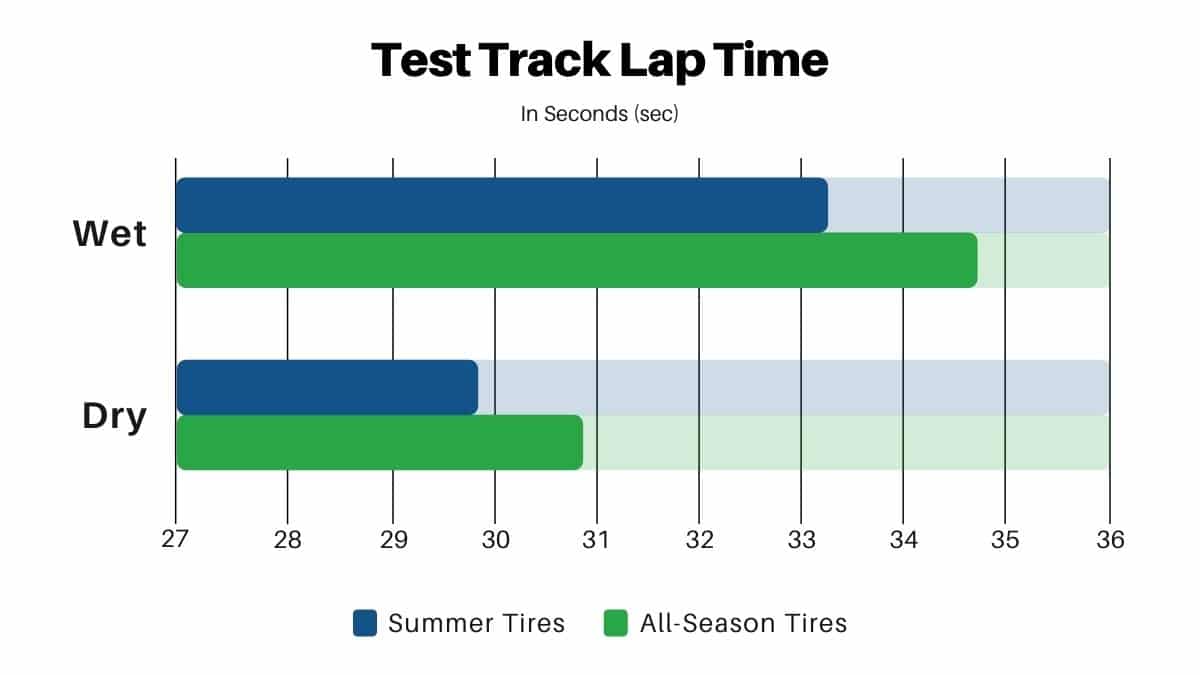
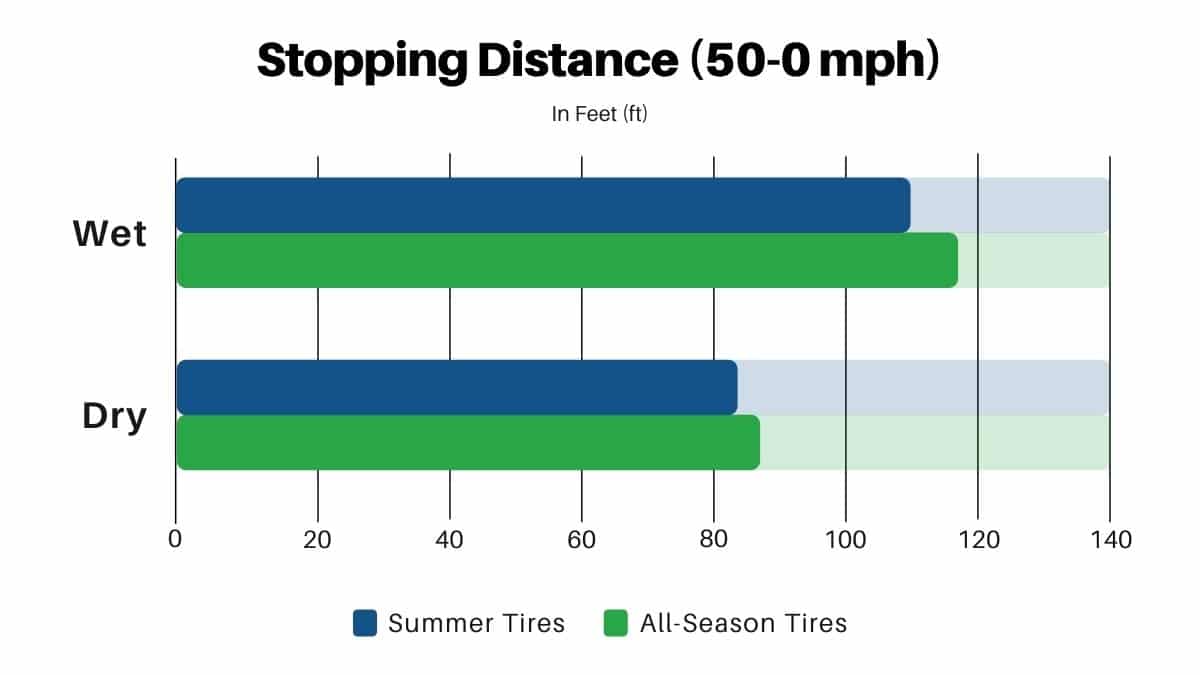
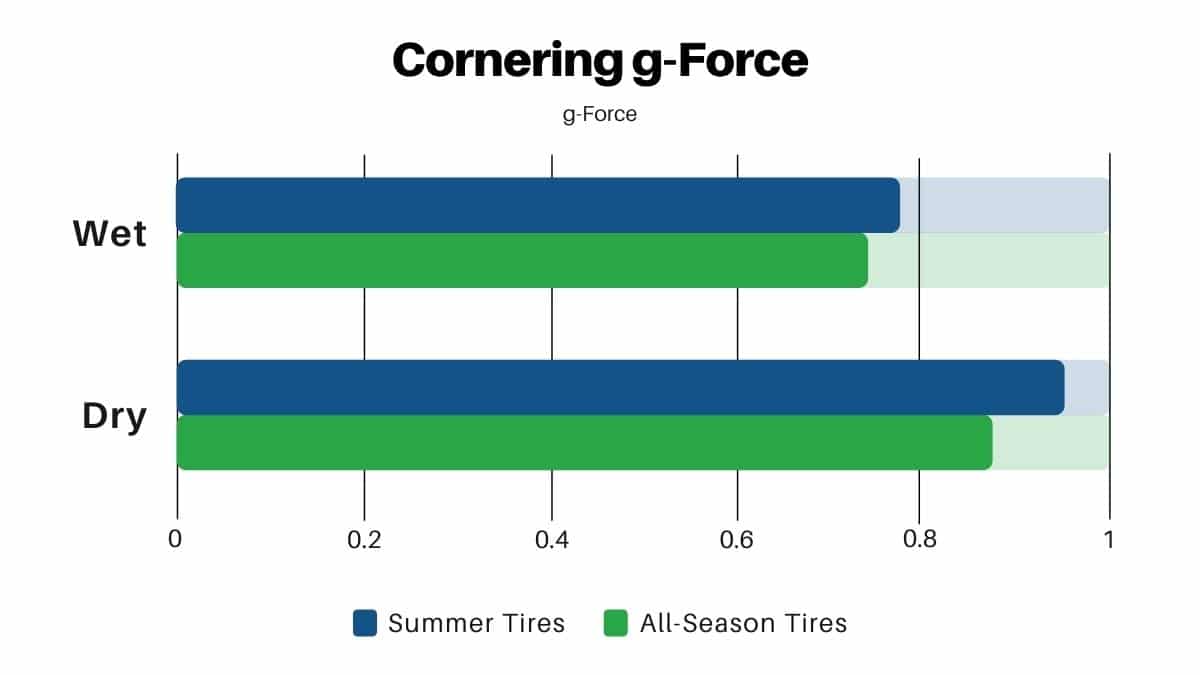
Why do Summer Tires Perform Better in Rain Compared to All-Season Tires?
The reason summer tires perform better in rain is that the tread compound (the rubber and filler mixture that makes up the tread) is made with sticky compounds that’s perfect for wet road traction. However, when the heat is on, this tread mixture offers enough rigidity for tires to stand up and maintain their shape. On hot pavement, this minimizes the rolling resistance as well.
Furthermore, tread patterns on summer tires are often shallower and straighter than all seasons, with solid, continuous ribs, and big grooves ensuring that more rubber is always in touch with the road, effectively pushing water away. This provides improved cornering, braking, and acceleration stability in both dry and wet conditions.
Though it may surprise many that summer tires beat all-season tires in both wet and dry traction, one thing is certain: Winter traction is not provided by summer/performance tires. They become rigid in cold temperatures and aren’t a good choice in snow or ice.
Are All-Season Tires or Winter Tires Better in The Rain?
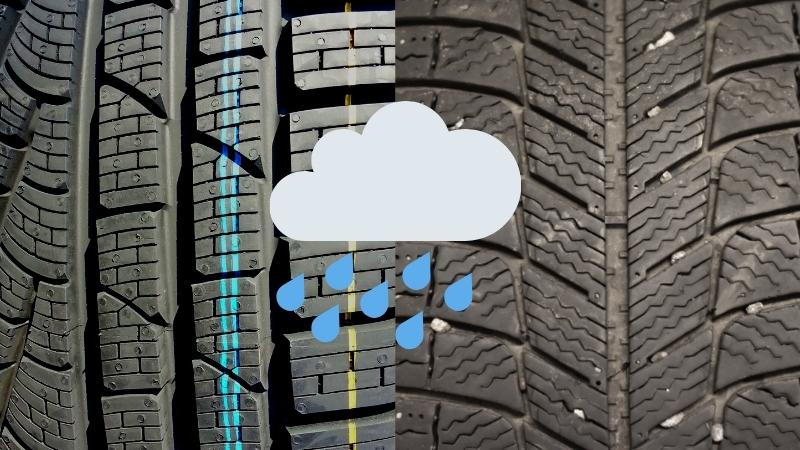
All-season tires combine the advantages of summer and winter tires. However, all-season tires sacrifice some attributes for more extreme conditions such as heavy rain, snow or significant road icing to maintain their signature well-roundedness.
Winter tires are better than all-season tires when driving in the rain, but only if temperatures are around 0-7 degrees Celsius (32-45 degrees Fahrenheit). At higher temperatures all-season tires are becoming the better option, summer tires are even better as discussed earlier.
The reason for this is that the rubber in most all-season tires hardens a lot below 7 degrees Celsius (45 degrees Fahrenheit) making it a lot slippier than above that temperature.
Are All-Season Tires Good in Freezing Rain?
All-season tires are designed to provide a smooth, quiet ride in most conditions. Many all-season tires perform well in the rain and on bare pavement all year. But, when it comes to freezing rain, all-season tires are not the best, a specialized winter tire will do a much better job and hence be the safer option.
Though all-season tires can provide some grip in freezing rain, light snow and the rare winter storm, most of them aren’t built for these weather conditions (at least not temperatures below 7 degrees C (45 degrees F).
Our Top 3 All-Season Tire Picks For Rainy Weather
Below we will list our top 3 all-season tire picks specifically recommended for rainy weather.
Best Quality Passenger Car Pick
Michelin Premier A/S
The Michelin Premier A/S was created to give excellent wet weather traction.
According to Michelin, these tires use extreme silica and sunflower oil enhanced tread compounds to maximize grip in wet and freezing situations. They also feature a unique tread pattern with ‘Expanding Rain Grooves’ that broadens as the tire wears, ensuring that your wet weather traction remains strong.
These tires are ideal for drivers who frequently face rain and damp roads, but there is a cost. Compared to similarly priced all-season tires, they wear out quickly, so if you don’t prioritize wet weather performance, a more balanced all-season tire may be a better fit.
Pros
- Specifically designed for wet weather
- Wet weather performance doesn’t reduce as tire wears
Cons
- Can wear quickly
- A bit pricey
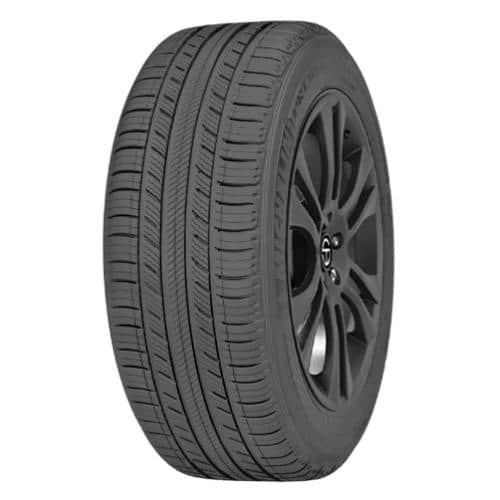
You can learn more about the Michelin Premier A/S by pressing the button below
Best Light Truck, SUV and Crossover Pick
Bridgestone Dueler H/L Alenza Plus
Earning an ‘Excellent’ rating from Tire Rack in wet weather performance, this tire is ideal for truck, SUV, and crossover drivers who frequently face wet roads, standing water, and rain on their daily commute.
Furthermore, they wear out slowly, ensuring that they will endure a long time. This is especially essential for pickup, SUV, and crossover drivers who may rack up miles on family road trips, on their way to and from work, or at work.
While they are on the expensive side, these are among the best all-season tires made expressly for use on larger vehicles, and they outperform several competing sets of rubber in wet weather.
Pros
- Designed for trucks, SUVs, and crossovers
- Long-lasting
- Great wet weather grip
Cons
- Expensive
- can be noisy
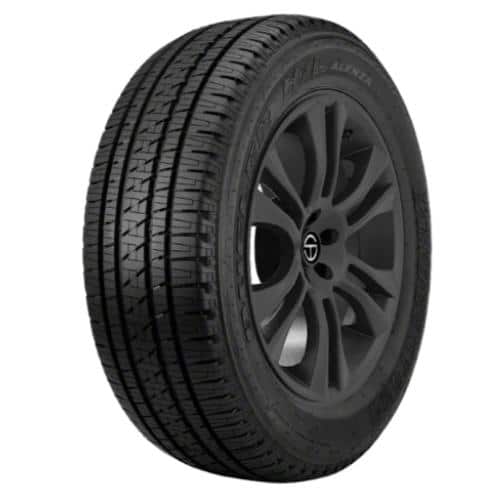
You can learn more about the Bridgestone Dueler H/L Alenza Plus by pressing the button below
Best Budget Pick
Vredestein Quatrac 5
The Vredestein Quatrac 5 is a typical all-season tire designed for mainstream automobiles and crossovers.
This tire offers a plush, smooth ride without sacrificing wet weather handling or traction. These tires give excellent traction in both wet and dry conditions, and they may also be used in mild snow. These tires are particularly helpful if the roads where you live are tough due to their capacity to soften your car’s ride.
TireRack also provides these tires an ‘Excellent’ rating in every category, including wet and dry grip, winter/snow efficiency, and comfort performance.
The Vredestein Quatrac 5 is a nice all-season tire that we’d suggest to any vehicle or crossover owner. It has a very attractive price tag, durability, a comfortable ride, excellent wet traction, and even strong performance in light snow.
Pros
- Right price
- Comfortable ride
- Best grip in both wet and snow
- Durable
Cons
- It can be a bit noisy
- Not designed for spirited driving
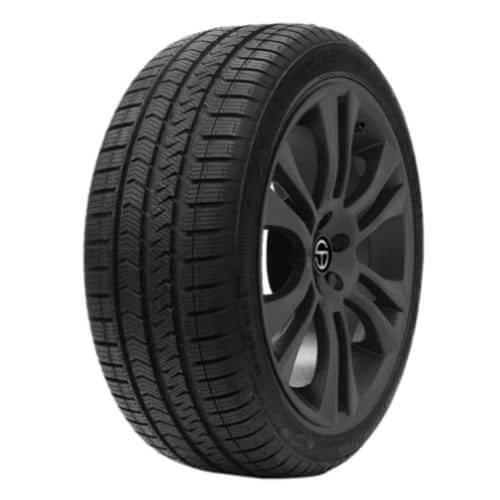
You can learn more about the Vredestein Quatrac 5 by pressing the button below
Hi, my name is Niklas, the head content creator & CEO of Whirling Wheelz. I am very interested in vehicles of all kinds, mainly cars. I have a car mechanics degree from high school and a big hobby of mine is to follow the WRC (World Rally Championship) both online and through travel.

